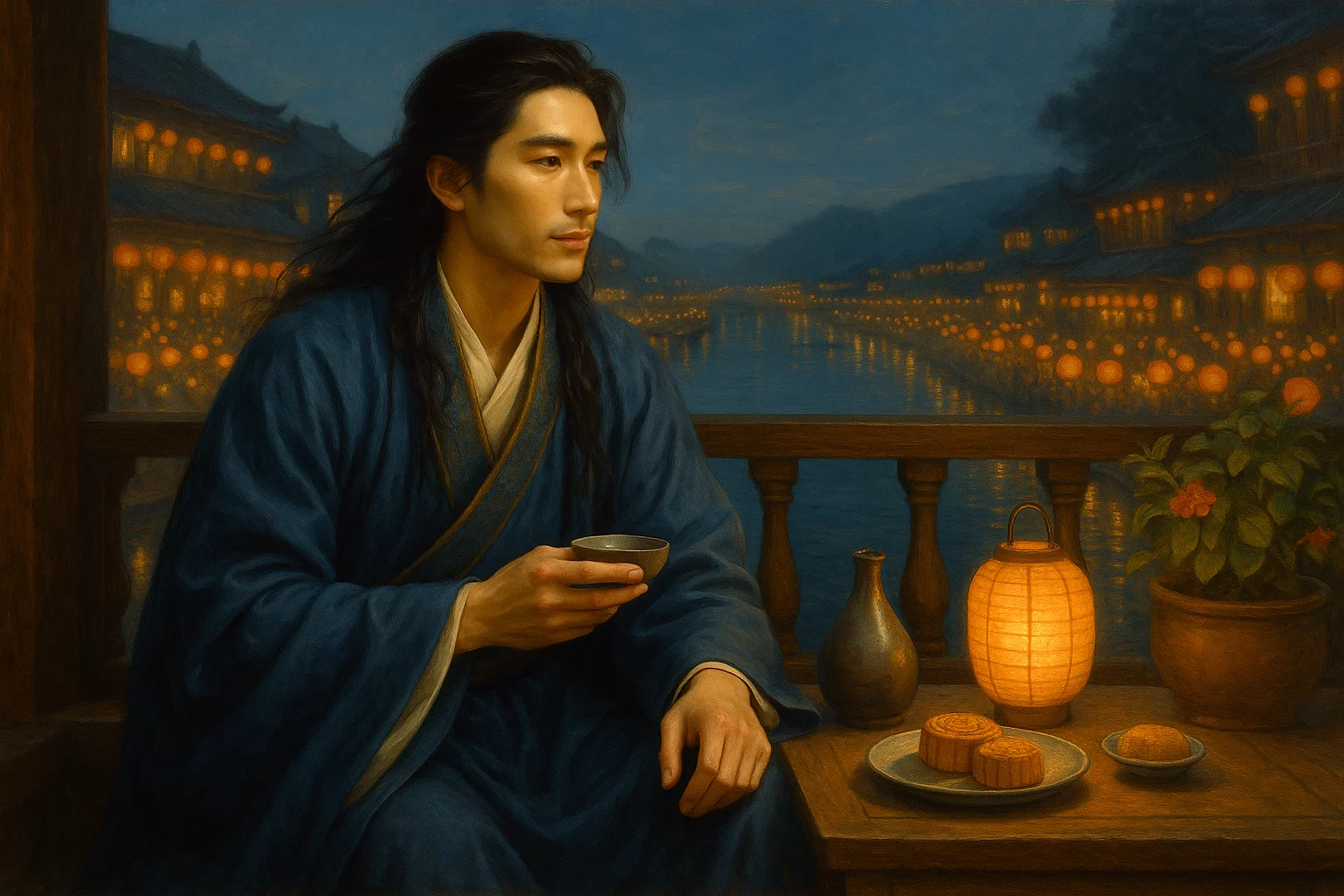The jade zither sheds vain tears of grief,
Only Wenjun knows the melody's soul.
Moonlit curtains frame the lofty tower,
Warmed wine and sweet scents—spring's essence whole.
Lush grass blurs the thousand-mile view,
The wandering prince roams, filled with rue.
Turning back to the horizon's end—
At Twenty-Four Bridges, song and dance ascend.
Original Poem
「玉楼春 · 玉琴虚下伤心泪」
周邦彦
玉琴虚下伤心泪。只有文君知曲意。
帘烘楼迥月宜人,酒暖香融春有味。
萋萋芳草迷千里。惆怅王孙行未已。
天涯回首一销魂,二十四桥歌舞地。
Interpretation
This short lyric, composed during Zhou Bangyan's later years, subverts the conventional cheerfulness of its tune with a melancholic grace. Written during his political exile and personal wanderings, the poem mourns lost loves, abandoned places, and bygone affections through the lens of spring's passing. Its subdued elegance and lingering sorrow reflect the poet's profound grief following career setbacks and life's displacements, transforming seasonal observation into a meditation on irrevocable loss and unrequited understanding.
First Stanza: "玉琴虚下伤心泪。只有文君知曲意。"
Yù qín xū xià shāng xīn lèi. Zhǐ yǒu Wén jūn zhī qǔ yì.
The jade zither hangs mute,
shedding silent tears—
only a Wenjun
could know this melody's heart.
The opening couplet establishes the poem's central paradox—music unheard yet profoundly affecting. The "mute zither" (虚下) becomes a vessel for unsounded grief, its "silent tears" (伤心泪) materializing emotional resonance beyond auditory limits. The allusion to Zhuo Wenjun (文君), the Han dynasty poetess who famously eloped with musician Sima Xiangru, symbolizes idealized artistic kinship—a listener capable of decoding the poet's encrypted sorrow. This reference elevates personal melancholy to timeless artistic yearning, where true comprehension remains perpetually out of reach.
Second Stanza: "帘烘楼迥月宜人,酒暖香融春有味。"
Lián hōng lóu jiǒng yuè yí rén, jiǔ nuǎn xiāng róng chūn yǒu wèi.
Curtains warm the tall chamber,
moonlight caresses—
wine's heat melts fragrance,
spring breathes flavor.
This couplet constructs a sensual sanctuary where domestic details radiate comfort. The "warmed curtains" (帘烘) and "caressing moonlight" (月宜人) create intimate ambiance, while "fragrant wine" (香融) and "flavored spring" (春有味) engage taste and smell. Yet this sensory richness underscores emotional poverty—the very perfection of the environment highlights the poet's unshared solitude. Zhou masterfully employs the Chinese aesthetic principle of "joyful scenes amplifying sorrow" (以乐景写哀情), making beauty itself the measure of absence.
Third Stanza: "萋萋芳草迷千里。惆怅王孙行未已。天涯回首一销魂,二十四桥歌舞地。"
Qī qī fāng cǎo mí qiān lǐ. Chóu chàng wáng sūn xíng wèi yǐ. Tiān yá huí shǒu yī xiāo hún, èr shí sì qiáo gē wǔ dì.
Lush grasses blur
a thousand miles of road.
The wandering prince
still travels on.
A skyline glance—
one soul-dissolving turn—
to Twenty-Four Bridges
where song and dance once flourished.
The finale unfolds as cartographic elegy. The "lush blurring grasses" (萋萋芳草) recall Qu Yuan's exile imagery, transforming vegetation into obstruction. "Wandering prince" (王孙) operates ambiguously—both as distant lover and the poet's own displaced self. The "soul-dissolving glance" (销魂) toward Twenty-Four Bridges (二十四桥), Yangzhou's famed pleasure quarter, collapses memory and geography into overwhelming nostalgia. This spatial imaginary—from obscured paths to remembered revelry—charts emotional wayfinding through loss's labyrinth.
Holistic Appreciation
Zhou orchestrates a sensory symphony where each element—silent music, fragrant warmth, obliterating vegetation—contributes to an existential dissonance. The poem progresses from intimate stasis (unplayed zither) through sensual plenitude (wine-warmth) to geographical desolation (overgrown roads), mapping a psyche retreating from present deprivation into memorial splendor.
The work's brilliance lies in its inverse emotional architecture: the opening's silent instrument contains infinite sound, the middle's perfect comfort amplifies loneliness, and the finale's vibrant memory (song-dance bridges) underscores present desolation. This structural paradox mirrors Zhou's life—a celebrated artist perpetually out of place, whose most exquisite verses emerged from displacement.
Artistic Merits
- Acoustic absence
The tearful yet soundless zither (玉琴虚下) redefines musical expression through imagined resonance. - Synesthetic richness
"Flavored spring" (春有味) and "fragrant wine" (香融) create cross-sensory intoxication. - Botanical obscurity
The "lush blurring grasses" (萋萋芳草) transform nature into cognitive barrier. - Cartographic nostalgia
The Twenty-Four Bridges (二十四桥) location memorializes pleasure as geographical rather than temporal loss.
Insights
Zhou's poem reveals artistic expression as palimpsest—the "silent zither" overwritten with tears, the "flavored spring" infused with memory, the "blurred paths" obscuring but not erasing destinations. This layering suggests that true loss is never absolute, but rather a cumulative obscuring through which original joys still faintly glow.
For contemporary readers, the work models how to navigate dislocation—whether geographic, emotional or existential. The poet's "soul-dissolving glance" backward acknowledges pain's transformative power, while the precision of "Twenty-Four Bridges" demonstrates how specific coordinates can anchor wandering minds.
Ultimately, the poem posits that understanding, like Zhuo Wenjun's fabled musical discernment, may be eternally deferred—yet in this very deferral lies art's generative power. Zhou's mute zither, rather than signaling failure, becomes the perfect instrument for playing the unspeakable, its silence more eloquent than any sounded note.
About the Poet

Zhou Bangyan (周邦彦 1056 - 1121), a native of Qiantang (modern Hangzhou, Zhejiang), was the culminating master of the wanyue (graceful and restrained) ci poetry of the Northern Song Dynasty. A virtuoso in musical temperament, his ci are renowned for their opulent refinement and technical perfection. He created dozens of new melodic patterns (cipai) and adhered to strict tonal rules, earning him the title "Crown of Ci Poets." His influence extended to Southern Song masters like Jiang Kui and Wu Wenying, establishing him as the founding patriarch of the Rhymed Ci School.












